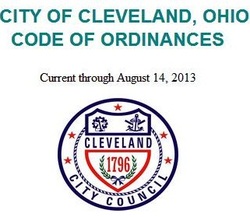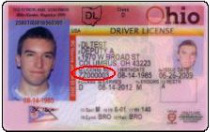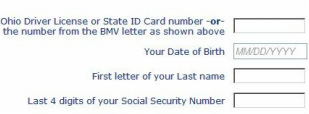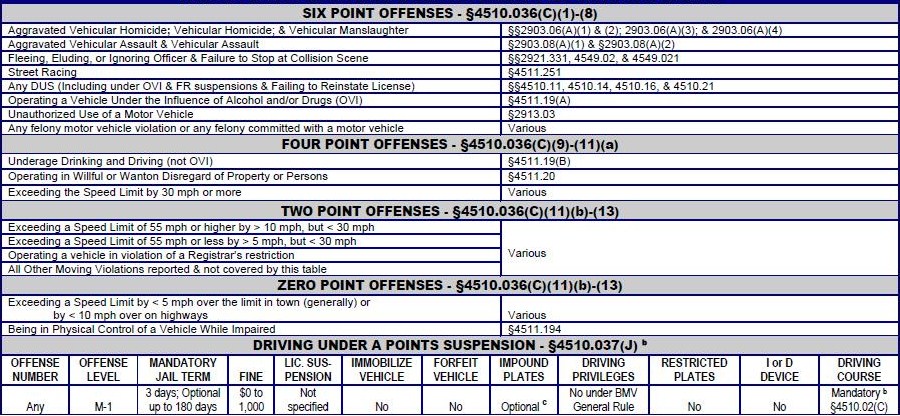|
Frequently Asked Questions
(Scroll down to see answers) Where can I check my Ohio driving record and see if I have a valid drivers license? How many points is my driving/traffic offense? I have too many traffic points. Can I get them reduced? How do I reinstate my license after a twelve point suspension? Where can I take the 72 hour (3 day) Driver Intervention Program for an OVI/DUI Offense? How many points is my speeding ticket? Where can I access the City of Cleveland Code of Ordinances? What are my rights if a police officer stops me on the street? When can I be arrested? If I am arrested, what will the police do? What are my rights in court? What is the difference between no contest and a guilty plea? What are the consequences of having a felony on my record in Ohio? I am incarcerated, how do I give someone temporary custody of my child/children? How can I locate an inmate? |
Where can I check my Ohio driving record and see if I have a valid drivers license?
How many points is my driving/traffic offense?I have too many traffic points. Can I get them reduced?Once a driver reaches 12 points on his or her driving record within a two-year period they are subject to a six month license suspension. In addition, some employers or insurance companies require a driver to maintain a certain point balance for employment or to maintain insurance.
If the points charged against the driver are 2 but less than 12, the driver may be applicable to complete a remedial driver course. The remedial course can be completed once every three years, a maximum of five credits can be granted within a lifetime. The purpose of the course is to grant a two-point credit against the total amount of points charged within a two-year period. Click HERE to find listings of approved remedial driving schools throughout Ohio. How do I reinstate my license after a twelve point suspension?If you receive a 12-point license suspension (An accumulation of not less than 12 points on your driving record within a two-year period), your license is suspended for six months effective the 20th day after mailing of the notice. The Reinstatement Requirements pursuant to ORC Section 4510.038 are:
Where can I take the 72 hour (3 day) Driver Intervention Program for an OVI/DUI Offense?Ohio has mandatory sentencing for those persons convicted of OVI/DUI. If you are convicted of a 1st offense OVI/DUI, there is a minimum mandatory jail sentence of 3 days; however, the Court can allow you to participate in a 72 hour (3 Day) Driver Intervention Program (also called Alcohol Intervention Program), in lieue so long as it is served at a State approved program. We would advise that no individual go to Court for an OVI/DUI without legal representation.
These 3 day Ohio Driver Intervention Programs (DIP's) are often held at hotels and provide a welcome alternative to spending 3 days in the county jail. Most courts have a list of the driver intervention programs that they will allow you to participate in, however, if you live in an area other than where you were cited for your OVI/DUI offense, the information in this site will help you provide the court with the approved driver intervention program in your area of Ohio. You can find an authorized Ohio OVI 72 Hour Intervention Program in your area by clicking HERE. How many points is my speeding ticket?Any Ohio driver convicted of a traffic violation is assessed a specific number of penalty points according to the type of violation. Should that driver be convicted of a second or subsequent offense within two years after the first violation, the point assessment for the new violation is added to the previous total. The number of penalty points given to a violator are assessed by the court system. Following is a schedule of point assessments for specific violations:
Six-Point Violations
Where can I access the City of Cleveland Code of Ordinances?

The Codified Ordinances of the city of Cleveland, also known as "The Code", are the ordinances of a permanent and general nature of the city of Cleveland. Please click HERE to view the most current Charter and Codified Ordinances online. What are my rights if a police officer stops me on the street?
A person is “stopped,” or “detained,” when an officer uses enough force, or a show of authority, to make a reasonable person feel he or she is not free to leave. If the officer interferes with your liberty to move about, he or she should first have a reasonable suspicion that you have been involved in a crime. The officer would need to support this suspicion later (should the matter should wind up in court) by referring to specific facts that prompted the suspicion.
The police do not have to tell you that you are a suspect or that they intend to arrest you, but if they use force or a show of authority to keep you from leaving, they probably consider you a suspect, even if you were the person who called the police. If they read or recite your Miranda rights, they suspect you have committed a crime. You have the right, if you are stopped, to refuse to answer any questions for any reason or no reason. You should invoke your right to silence by saying, "I refuse to answer any questions" or "I want to speak to a lawyer" or "I wish to remain silent." There is one exception to your right to silence: According to Ohio law since April 2006, if you are in a public place and under certain circumstances, you must give your name, address and date of birth to an officer. If you fail to provide this information under such circumstances, you will be committing a fourth-degree misdemeanor and may be arrested. Also, if you are only being stopped, you can refuse to give your consent for an officer to search your person, vehicle or home. Your refusal will force the police officer to legally justify any search made without your consent. Be aware, however, that Ohio law does permit some limited searches (such as patdowns) in "stop" situations in order to search for weapons. Even if you believe the officer has no grounds to stop and question you, do not argue with or resist the police. Arguing or resisting will not help you, and may make it more likely that the police will arrest you and bring criminal charges against you. It may also give them grounds to bring even more criminal charges against you, which can make it harder for you to get out of jail on bail if you are charged. We would advise you to contact an attorney whenever you are approached by a police officer. What are my rights if I am arrested?
An officer who wants to ask you questions other than your name and address must advise you that you have a right not to answer the questions. You have the right to be told why you are being arrested and the nature of the charges against you (the crime for which you are being arrested). If you are arrested on a warrant, you have the right to see the warrant within a reasonable time after your arrest, to read it and make certain your name appears on it, and to see the charge against you.
You have the right to be told your constitutional rights ("Miranda" rights) before being questioned following your arrest. Your Miranda rights are:
You CANNOT be penalized for refusing to answer an officer’s questions. If you try to cooperate by answering questions while you are being held in police custody, you may create difficulties for your lawyer in defending you. ALWAYS ASK TO SPEAK TO A LAWYER. You also have the right to:
If I am arrested, what will the police do?
The police will search you for weapons, handcuff you, transport you to jail, and photograph and fingerprint you for identification. If you are not under arrest or if police do not have a search warrant (a court order allowing them to search), the police may ask you to let them search your car, your home and/or other possessions. YOU CAN REFUSE TO CONSENT TO SEARCHES.
You have a right to be free from unreasonable searches and seizures. Most of the searches for which an officer might ask your consent would require the officer to first get a warrant from a judge,unless you consent and give up this right. Only a judge can decide whether the search is proper before that search is conducted. There is no penalty for exercising your right to have the judge decide whether to allow the search. Your refusal to consent to a search cannot be used against you. If you are unsure how to respond to an officer's request, assert your right to counsel and discuss the request with your attorney before doing or saying anything. Since July 1, 2011, Ohio law has required that a law enforcement agency must collect and forward a DNA specimen to the Bureau of Criminal Identification and Investigation when the agency arrests a person 18 years or older for a felony. What are my rights in court?
Within 72 hours after your arrest, the judge must:
What is the difference between no contest and a guilty plea?
No contest means you admit the facts in the complaint are true, but you deny guilt. The judge may find you guilty or not guilty. (A no contest plea cannot later be used against you in a civil lawsuit for money damages. Anyone who later sues you over the incident must prove you were at fault and violated the law.) Most no contest pleas result in a guilty finding unless the arresting officer has cited you under the wrong statute or ordinance, or if the arresting officer’s written statement of facts fails to sufficiently support the charge.
Guilty means you admit the crime(s) of which you are accused and waive (give up) your right to a trial, where the prosecution would have to prove you guilty beyond a reasonable doubt. You also give up your right to remain silent. The judge may sentence you immediately or at a later hearing. A guilty plea can later be used to prove you were at fault in a civil lawsuit. A guilty plea can also lay the basis for a harsher punishment if you are later convicted of another offense. We would advise that you never plead no contest or guilty to a crime without first consulting with an attorney. What are the consequences of having a felony on my record in Ohio?Although some consequences, such as loss of the right to bear arms or to vote, are often recognized, many others are often overlooked or unknown until it is too late. Some are a function of state law; others are imposed by federal law or regulation. Some consequences flow only for certain types of offenses, such as sexually based crimes.
In the state of Ohio, pleading guilty to a felony can effect the following rights: voting, bearing arms, holding public office, jury service, witnessing documents, loss of state licenses, federal benefits, immigration, military service and benefits, federal contract exclusion, federal employment and licensure/security restrictions, and international travel. Some felony offenses are expungable after three years. Contact our office to find out if you are eligible. Click HERE to read about the consequences a felony criminal conviction has in the State of Ohio. I am incarcerated, how do I give someone temporary custody of my child/children?
At some point, there may come a time when you need to turn over the care of your children temporarily to another adult due to a pending criminal case. If you share custody with your child's other parent, then setting up temporary guardianship with another adult would not be necessary, as the other parent would most likely be the person caring for your children in your absence.
If you are a single parent or both mother and father are incarcerated, you need to think of someone whom you trust completely and with whom your children are comfortable. This will likely be a person your children have already spent considerable time with. Ask this person whether he or she would be willing and able to care for your children temporarily. Make sure you inform the temporary guardian of any medical concerns, including food allergies. In addition, you'll need to agree on things like sleeping arrangements, the administration of over-the-counter medications, and procedures for contacting you in an emergency. We would recommend that you contact an attorney to discuss all of your options and the legalities regarding a temporary custody agreement before moving forward. How can I locate an inmate?Both the State of Ohio and the Bureau of Prisons (BOP) have websites available to locate an inmate that has already been sentenced in either a state of federal prison. You can locate a state of Ohio or Federal inmate by clicking HERE.
If the inmate has a pending case, you will need to contact the local jail(s) to locate the inmate. You will need to know the inmates first and late name and date of birth. To view local jail information, click HERE. |
Jaime P. Serrat LLC.55 Public Square
2100 Illuminating Building Cleveland, OH 44113 (216) 696-2150 |
The choice of a lawyer is an important decision and should not be based solely upon advertisements.
No statements made or opinions given on this website constitute the establishment of an attorney client relationship or constitute legal advice.
We would always advise that you contact an attorney whenever you are in need of legal advice.
No statements made or opinions given on this website constitute the establishment of an attorney client relationship or constitute legal advice.
We would always advise that you contact an attorney whenever you are in need of legal advice.



